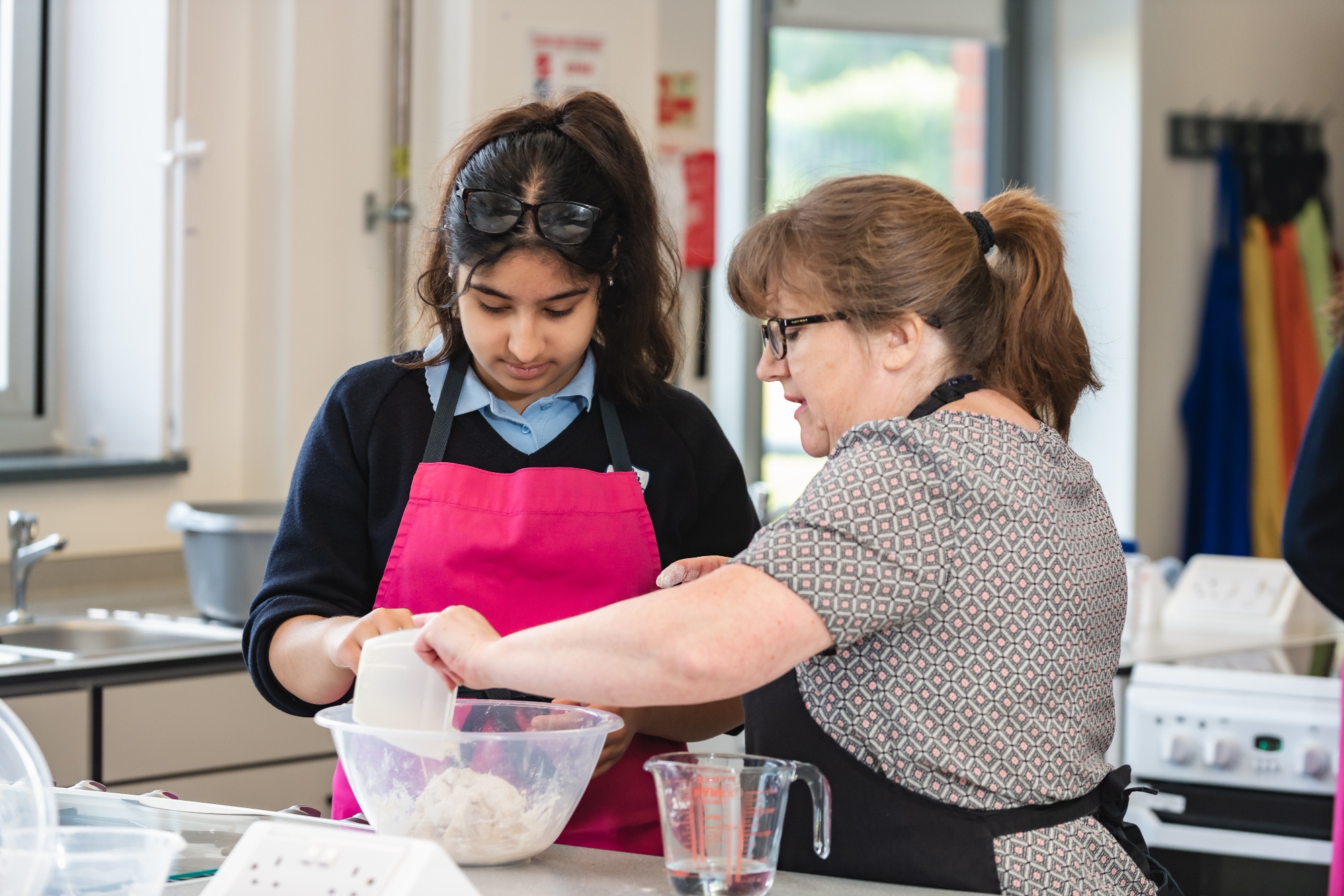Food Technology

Subject Lead: Steph Reid
By the End of Key Stage 3:
Students will:
- Develop foundational culinary skills and techniques.
- Gain a basic understanding of nutrition, the Eatwell Guide, and healthy eating principles.
- Build confidence in designing, preparing, and making a variety of balanced dishes.
- Learn to use kitchen equipment safely and hygienically.
- Explore the environmental and global impact of food choices, such as food miles and the benefits of seasonal produce.
- Key outcomes include fostering independence and creativity in the kitchen and instilling an awareness of safe food handling practices.
By the End of Key Stage 4:
Students will:
- Deepen their knowledge and understanding of nutrition and healthy eating, including how different dietary needs and preferences affect food choices.
- Study food safety and hygiene regulations and how these principles are applied in professional food preparation settings.
- Build on their cooking and preparation skills to confidently create complex dishes.
- Understand the environmental impact of food production and explore sustainable cooking practices.
- Assessment at Key Stage 4 will also include theoretical understanding and practical application through coursework and examinations as outlined in the AQA specification.
Assessment
- Students’ progress will be assessed through:
- Practical cooking tasks, demonstrating safe and effective use of equipment and techniques.
- Theory work on nutrition, healthy eating, food safety, and sustainability.
- Peer and self-evaluations to encourage reflection on skill development and learning.
- End-of-topic tests or project-based assessments, designed to reflect the AQA Food Preparation and Nutrition framework.
Homework
- Homework tasks are designed to extend students' learning beyond the classroom. These may include:
- Research on topics like nutrition, healthy eating guidelines, or sustainable food practices.
- Practical planning tasks, such as designing balanced meals.
- Reflection and evaluation tasks related to practical cooking lessons.
- Homework is graded based on effort, quality of work, and relevance to the current topic.
GCSE Subject Content Years 9, 10, 11.
The GCSE Food Preparation and Nutrition specification focuses on the knowledge, understanding, and skills needed to cook and apply principles of food science, nutrition, and healthy eating.
Students will apply their theoretical understanding of food and nutrition to practical cooking tasks, integrating knowledge into real-world scenarios.
Key Topics
The AQA specification is divided into five main areas:
Food, Nutrition, and Health
- Nutritional needs of individuals at different life stages.
- Relationship between diet and health, including diet-related diseases.
- Nutrients
Food Science
- The functional and chemical properties of ingredients and their applications in cooking.
- Cooking methods and heat transfer
- Raising agents
Food Safety
- Safe food preparation, storage, and handling to prevent contamination and ensure hygiene.
- Microorganisms in food production
Food Choice
- Factors influencing food choices, including cultural, social, and environmental considerations.
- Special dietary needs and food preferences.
Food Provenance
- The origins of food and the environmental impact of food production.
- Ethical and sustainable food sourcing.
Food Preparation Skills
- Practical skills are integrated throughout the course, enabling students to:
- Use a variety of cooking techniques such as chopping, blending, baking, and frying.
- Prepare dishes using diverse ingredients while ensuring high standards of hygiene and safety.
- Combine techniques to achieve specific outcomes (e.g., creating pastry, emulsions, or sauces).
- Evaluate their dishes based on sensory, nutritional, and presentation qualities.
- The 12 AQA food preparation skill groups are applied to real-world cooking scenarios to help students master complex tasks and refine their techniques.
Assessment Overview
Component 1: Food Preparation and Nutrition (Examination)
- Format: Written exam, 1 hour 45 minutes.
- Section A: Questions based on the five topics.
- Section B: Structured, short, and extended response questions.
- Weighting: 50% of GCSE.
Component 2: Food Preparation and Nutrition(Non-Examination Assessment)
- Weighting: 50% of GCSE.
- Tasks:
- Food Investigation Task (15%)
- A scientific investigation to assess knowledge and understanding of food science principles.
- Duration: Approximately 10 hours.
- Food Preparation Task (35%)
- Plan, prepare, cook, and present a menu to showcase knowledge, skills, and understanding of food preparation and presentation.
- Duration: Approximately 20 hours, including 3 hours for a final practical assessment.
How Parents and Carers Can Support
Parents and carers play a vital role in supporting students’ progress. Here’s how you can help:
- Ensure your child brings a suitable, named container for their practical cooking products.
- Encourage your child to complete homework tasks on time and to a high standard.
- Provide opportunities for your child to practice cooking at home, building their confidence and skills.
- Discuss healthy eating and involve your child in shopping for ingredients, encouraging awareness of budgeting and sustainable choices.
- Promote the use of resources such as books, online materials, and AQA-specific guides to reinforce their learning.
